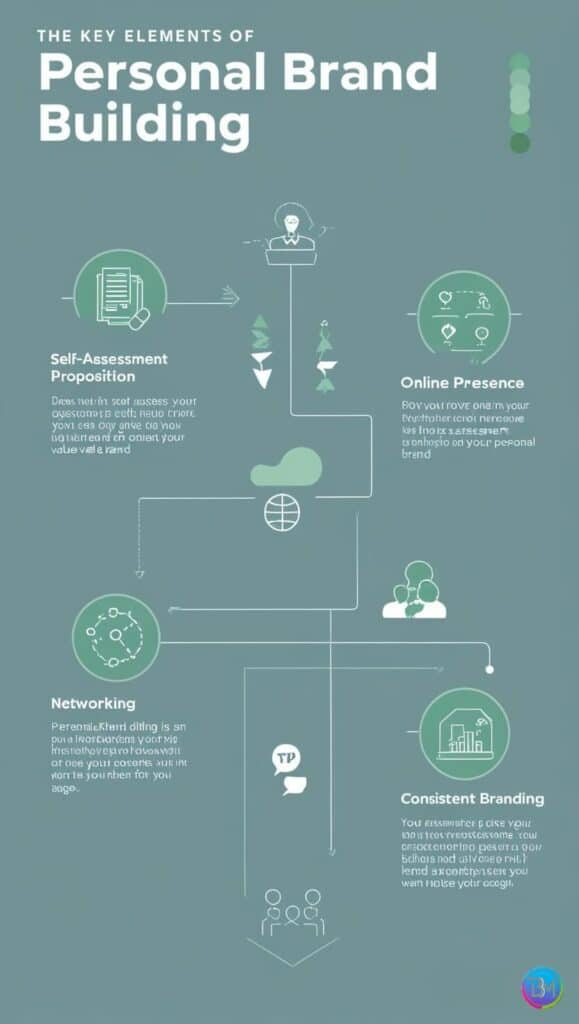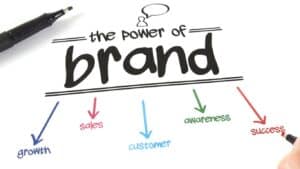In today’s competitive landscape, establishing a strong personal brand is essential for career advancement and professional success. Whether you’re seeking to climb the corporate ladder, pivot into a new industry, or enhance your entrepreneurial endeavors, personal brand building serves as the foundation for your professional identity. This comprehensive guide delves into the key aspects of personal brand building, professional branding, and career development tips to help you navigate your path to success.
Understanding Personal Branding
Personal branding is the process of creating and managing a unique professional identity that distinguishes you from others in your field. It encompasses your skills, experiences, values, and personality, all of which contribute to how you are perceived by others. A well-crafted personal brand communicates your strengths and expertise, making you more attractive to potential employers, clients, and collaborators.
Why Personal Branding Matters
In an era where digital presence can significantly impact career opportunities, personal branding has become more crucial than ever. A strong personal brand can:
- Enhance Visibility: Stand out in a crowded job market or industry.
- Build Trust: Establish credibility and trust with your audience or employers.
- Facilitate Networking: Attract like-minded professionals and mentors.
- Drive Opportunities: Open doors to new career paths, partnerships, and projects.
📊 Personal Branding Stats
Latest Research & Data
85%
Of job success comes from having well‑developed soft skills
92%
Of recruiters use social media to evaluate candidates
76%
Of professionals say networking led to new opportunities
88%
Of companies prioritize personal branding in hiring
- Professional Industry Reports
- Global Career Studies
- Employment Research
- Recruitment Trends Analysis
The Importance of Professional Branding
Professional branding is a subset of personal branding that specifically relates to your career and professional life. It focuses on how you present yourself in professional settings, including your resume, LinkedIn profile, and interactions with colleagues and industry peers.
Key Benefits of Professional Branding
- Career Advancement: A strong professional brand can lead to promotions and leadership roles.
- Job Security: Being recognized as an expert can provide job security and negotiation power.
- Marketability: Increases your attractiveness to potential employers and clients.
- Reputation Management: Controls how others perceive you in your professional sphere.
🚀 Level Up Your Personal Brand
Download our FREE Personal Branding Strategy Workbook and start building your professional presence today!
- ✨ Step-by-step brand building exercises
- 💫 Professional identity development
- ⭐ Personal brand action plan
Key Elements of Personal Brand Building
Building a personal brand involves several strategic steps. Below are the key elements to consider:
Self-Assessment and Discovery
Before you can build your personal brand, it’s essential to understand who you are and what you want to represent. This involves:
- Identifying Strengths and Weaknesses: Recognize your core competencies and areas for improvement.
- Clarifying Values and Passions: Determine what drives you and what you stand for.
- Understanding Your Audience: Know who you want to influence or attract with your brand.
Tools for Self-Assessment:
- SWOT Analysis: Evaluate your strengths, weaknesses, opportunities, and threats.
- Personality Tests: Tools like Myers-Briggs or DISC assessments can provide insights into your personality traits.
- Feedback from Peers: Gather input from colleagues, mentors, and friends to gain different perspectives.
Defining Your Unique Value Proposition
Your unique value proposition (UVP) is a statement that encapsulates what makes you unique and valuable. It should clearly communicate the benefits you offer and how you solve problems for your audience or employers.
Creating Your UVP:
- List Your Skills and Expertise: Highlight what you excel at.
- Identify Your Achievements: Showcase significant accomplishments.
- Determine Your Unique Qualities: What sets you apart from others in your field?
- Craft a Clear Statement: Combine these elements into a concise, impactful statement.
Example UVP: “I leverage my expertise in digital marketing and data analysis to drive strategic campaigns that increase brand visibility and ROI for mid-sized businesses.”
Establishing Your Online Presence
In the digital age, your online presence is a critical component of your personal brand. It serves as a platform to showcase your skills, share your thoughts, and connect with others.
Key Online Platforms:
- LinkedIn: Essential for professional networking and showcasing your career achievements.
- Personal Website or Blog: A centralized hub for your portfolio, resume, and personal content.
- Social Media: Platforms like Twitter, Instagram, and Facebook can help you engage with a broader audience.
- Professional Portfolios: Sites like Behance or GitHub (for developers) to display your work.
Tips for a Strong Online Presence:
- Consistent Branding: Use the same profile picture, color scheme, and tone across platforms.
- Regular Updates: Keep your profiles updated with recent achievements and content.
- Engage with Your Audience: Respond to comments, participate in discussions, and share valuable content.
- Optimize for Search Engines: Use relevant keywords to improve your visibility in search results.
Networking and Relationship Building
Building a network of professional relationships is vital for personal brand growth. Networking provides opportunities for mentorship, collaboration, and career advancement.
Effective Networking Strategies:
- Attend Industry Events: Conferences, seminars, and workshops are great places to meet professionals in your field.
- Join Professional Associations: Becoming a member of relevant organizations can expand your network.
- Leverage Social Media: Use LinkedIn and other platforms to connect with industry leaders and peers.
- Volunteer and Participate: Engage in community service or volunteer for projects to meet new people and showcase your skills.
Consistent Personal Branding
Consistency is key to a strong personal brand. It ensures that your audience receives a unified message across all platforms and interactions.
Maintaining Consistency:
- Visual Consistency: Use the same colors, fonts, and imagery across your online and offline materials.
- Message Consistency: Ensure your messaging aligns with your values and UVP.
- Behavioral Consistency: Demonstrate your brand through your actions and professional behavior.
- Content Consistency: Regularly produce and share content that reflects your expertise and interests.

Career Development Tips for Enhancing Your Personal Brand
Career development is intrinsically linked to personal brand building. Here are essential tips to help you advance your career while strengthening your personal brand:
Continuous Learning and Skill Development
The job market is constantly evolving, and staying updated with the latest skills and knowledge is crucial.
Strategies for Continuous Learning:
- Enroll in Online Courses: Platforms like Coursera, Udemy, and LinkedIn Learning offer courses on various topics.
- Attend Workshops and Seminars: Participate in events that provide hands-on experience and new insights.
- Read Industry Publications: Stay informed about trends and advancements in your field.
- Pursue Certifications: Earning certifications can validate your expertise and enhance your credibility.
🚀 Accelerate Your Career Growth
Access proven strategies and expert insights to take your professional journey to new heights.
Explore Career Resources →Setting and Achieving Career Goals
Setting clear, achievable career goals provides direction and motivation, aiding in personal brand development.
Steps to Effective Goal Setting:
- Define Your Long-Term Objectives: Determine where you want to be in 5-10 years.
- Set SMART Goals: Ensure your goals are Specific, Measurable, Achievable, Relevant, and Time-bound.
- Create an Action Plan: Outline the steps needed to achieve each goal.
- Monitor Progress: Regularly review and adjust your goals as necessary.
- Celebrate Milestones: Acknowledge and reward yourself for achieving goals to maintain motivation.
Seeking Mentorship and Guidance
Mentors can provide valuable insights, advice, and support as you navigate your career path.
Finding a Mentor:
- Identify Potential Mentors: Look for individuals who have achieved what you aspire to and possess relevant experience.
- Reach Out Professionally: Contact potential mentors through email, LinkedIn, or at networking events.
- Be Respectful of Their Time: Approach mentorship with clear intentions and be mindful of their availability.
- Build a Mutually Beneficial Relationship: Offer value in return, such as assistance with projects or sharing your own expertise.
Building a Professional Portfolio
A professional portfolio showcases your work, skills, and accomplishments, providing tangible evidence of your capabilities.
Components of an Effective Portfolio:
- Resume: A concise summary of your education, experience, and skills.
- Work Samples: Include projects, case studies, or presentations that highlight your expertise.
- Testimonials: Add endorsements from colleagues, supervisors, or clients.
- Certifications and Awards: Display any relevant credentials or recognitions.
- Personal Projects: Showcase initiatives that demonstrate your passion and creativity.
Creating a Digital Portfolio:
- Choose the Right Platform: Use website builders like WordPress, Wix, or Squarespace to create a professional-looking portfolio.
- Organize Content Clearly: Categorize your work for easy navigation.
- Ensure Accessibility: Make your portfolio mobile-friendly and easy to share.
- Update Regularly: Keep your portfolio current with your latest work and achievements.
Strategies to Build Your Personal Branding
Building a personal brand requires strategic actions and consistent effort. Below are effective strategies to enhance your personal branding:
Leveraging Social Media Platforms
Social media is a powerful tool for personal brand building, allowing you to reach and engage with a broad audience.
Best Practices for Social Media Branding:
- Choose the Right Platforms: Focus on platforms where your target audience is most active.
- Optimize Your Profiles: Use professional photos, compelling bios, and relevant keywords.
- Share Valuable Content: Post content that provides value, such as tips, insights, and industry news.
- Engage Actively: Respond to comments, participate in discussions, and collaborate with others.
- Monitor Your Presence: Regularly review your social media profiles to ensure they reflect your current brand.
Creating Valuable Content
Content creation establishes you as a thought leader and provides a platform to showcase your expertise.
Types of Valuable Content:
- Blog Posts: Share in-depth articles on topics relevant to your field.
- Videos: Create tutorials, interviews, or vlogs to engage visually.
- Podcasts: Host or participate in podcasts to reach auditory learners.
- Infographics: Use visuals to simplify complex information.
- E-books and Guides: Offer comprehensive resources that provide significant value.
Content Creation Tips:
- Be Authentic: Share your genuine thoughts and experiences.
- Stay Relevant: Focus on topics that align with your brand and audience interests.
- Maintain Quality: Ensure your content is well-researched, accurate, and professionally presented.
- Be Consistent: Develop a content calendar to maintain regular publishing.
Public Speaking and Thought Leadership
Public speaking and thought leadership activities can significantly enhance your personal brand by showcasing your knowledge and communication skills.
Opportunities for Public Speaking:
- Conferences and Seminars: Present on topics within your expertise.
- Webinars and Workshops: Host online sessions to reach a wider audience.
- Guest Lectures: Speak at educational institutions or training programs.
- Panel Discussions: Participate in panels to share diverse perspectives.
Becoming a Thought Leader:
- Share Insights: Regularly publish articles, opinions, and analyses on industry trends.
- Engage with Peers: Collaborate with other thought leaders to expand your reach.
- Innovate: Introduce new ideas or approaches that challenge the status quo.
- Maintain Credibility: Ensure your statements are backed by evidence and experience.
Personal Branding in the Workplace
Your personal brand extends into your workplace interactions and professional behavior. Cultivating a strong personal brand within your organization can lead to career growth and recognition.
Enhancing Your Brand at Work:
- Exhibit Professionalism: Demonstrate reliability, integrity, and a strong work ethic.
- Communicate Effectively: Practice clear and concise communication with colleagues and superiors.
- Show Initiative: Take on projects, propose solutions, and go beyond your job description.
- Build Positive Relationships: Foster collaborative and respectful relationships with team members.
- Seek Feedback: Regularly ask for and act on feedback to improve your performance.
Measuring and Refining Your Personal Brand
Building a personal brand is an ongoing process that requires regular assessment and refinement to ensure it remains effective and aligned with your goals.

Metrics for Measuring Your Personal Brand
- Online Engagement: Track likes, shares, comments, and followers on social media platforms.
- Website Traffic: Monitor the number of visitors and their interactions on your personal website or blog.
- Professional Opportunities: Count the number of job offers, collaborations, or speaking engagements you receive.
- Feedback and Testimonials: Collect qualitative feedback from peers, mentors, and your audience.
- Search Engine Rankings: Analyze how well your personal brand appears in search engine results for relevant keywords.
Refining Your Personal Brand
Based on the metrics and feedback, make necessary adjustments to your personal brand strategy.
Steps to Refine Your Brand:
- Analyze Data: Review your performance metrics and identify areas of strength and improvement.
- Seek Feedback: Ask for honest feedback from trusted sources to gain insights into how your brand is perceived.
- Adjust Your Strategy: Modify your content, online presence, or networking efforts based on your findings.
- Stay Updated: Keep abreast of industry trends and adapt your brand to stay relevant.
- Reiterate Your Goals: Ensure your personal brand continues to align with your evolving career objectives.
✨ Free Personal Branding Workbook
Level up your professional presence with our step-by-step strategy guide!
Download NowCommon Mistakes to Avoid in Personal Brand Building
While building a personal brand, it’s essential to steer clear of common pitfalls that can hinder your progress.
Inconsistency
Inconsistent branding can confuse your audience and dilute your professional image. Ensure that your messaging, visuals, and online presence are uniform across all platforms.
Lack of Authenticity
Attempting to present a persona that doesn’t align with your true self can lead to a lack of trust and engagement. Authenticity fosters genuine connections and credibility.
Neglecting Online Presence
Ignoring your online presence can limit your visibility and opportunities. Regularly update your profiles and engage with your digital audience.
Over-Promotion
While promoting your achievements is important, excessive self-promotion can be off-putting. Balance self-promotion with providing value to your audience.
Ignoring Feedback
Disregarding feedback can prevent you from improving and refining your personal brand. Embrace constructive criticism to enhance your professional image.
Failing to Adapt
Stagnant personal branding can become outdated. Continuously evolve your brand to reflect your growth and changes in your industry.
🌟 Personal Branding FAQ
Personal branding includes:
• Your professional identity 🎯
• Unique value proposition ⭐
• Online presence strategy 🌐
• Professional reputation 💫
• Career narrative development ✨
Key benefits include:
• Career advancement opportunities 📈
• Higher visibility in your industry 👀
• Better networking results 🤝
• Increased earning potential 💰
• Professional credibility boost ⚡
Key platforms include:
• LinkedIn for professional networking 💼
• Twitter for industry engagement 🐦
• Personal website/portfolio 🎨
• Industry-specific platforms 🎯
• Professional blog/Medium ✍️
Key metrics include:
• Professional network growth 📈
• Engagement on content 💫
• Speaking opportunities 🎤
• Industry recognition 🏆
• Career advancement milestones 🎯
Regular updates should include:
• Weekly social media presence 📱
• Monthly content creation 📝
• Quarterly skill updates 📚
• Bi-annual profile reviews 🔍
• Annual brand strategy revision 📊
Essential first steps:
• Define your unique value ⭐
• Identify target audience 🎯
• Create professional profiles 💼
• Develop content strategy 📝
• Start networking actively 🤝
Conclusion
Building a strong personal brand is a strategic endeavor that requires self-awareness, consistent effort, and continuous refinement. By understanding the principles of personal and professional branding, leveraging effective strategies, and avoiding common mistakes, you can create a compelling personal brand that enhances your career prospects and professional growth. Embrace the journey of personal brand building as an investment in your future, and watch as it opens doors to new opportunities and successes.
📚 Further Reading:
🌟 Career Excellence
Build Your Professional Brand
AI in Leadership
Future-proof your career ⚡
Success Mindset
Master professional growth 💫
Success Habits
Build winning routines 🎯
Future Career Tools
Digital career essentials ✨












